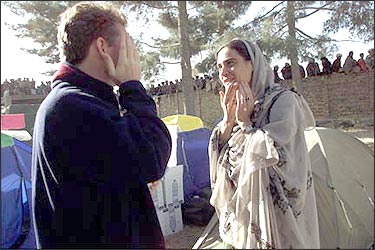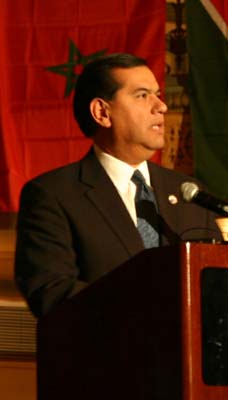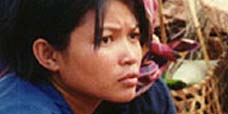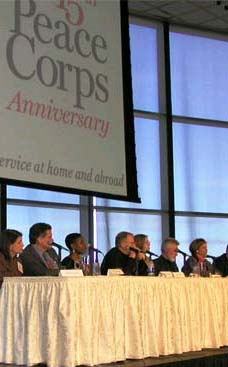
Morocco RPCV Sarah Chayes has made a home in Kandahar, Afghanistan, became fluent in Pashto, one of the main Afghan languages, and devoted her energies to rebuilding a country gutted by two decades of war
Morocco RPCV Sarah Chayes finds her calling in Afghan hot spot
American activist finds her calling in Afghan hot spot
By Declan Walsh, Globe Correspondent | May 9, 2006
KANDAHAR, Afghanistan -- In a city where women are rarely seen, never mind heard, Sarah Chayes talks tough politics with rough men, drives her own car, and keeps a gun under her bed.
''It's a Kalashnikov. I've never had to use it except for a little target practice," she says.
The macho image has helped the impassioned campaigner -- a self-described idealist from an accomplished Cambridge family steeped in academia and government service -- to carve out a role for herself in the troubled landscape of southern Afghanistan.
Since completing a tour as a reporter for National Public Radio in 2002, Chayes, 44, has made a home in Kandahar, became fluent in Pashto, one of the main Afghan languages, and devoted her energies to rebuilding a country gutted by two decades of war -- a unique mission for an American in a conservative city that was once the headquarters of Taliban rule.
She has helped rebuild homes and set up a dairy cooperative. Her latest venture involves encouraging farmers to grow roses instead of opium poppy.
Yet lately her enthusiasm has dissolved into disillusionment with the US-supported new order, which she describes as discredited, corrupt, and infected with drug money. But her biggest disappointment is President Hamid Karzai.
''I once believed passionately in President Karzai and his family. Not any more," Chayes, a talkative, tall woman with striking green eyes, said during a recent interview at her Kandahar office.
The same Taliban warlords who presided over the destruction of Afghanistan have been allowed return to power, she says, and the US-backed regime is fast losing legitimacy. For Chayes, a moment of truth came nearly one year ago with the death of a close friend, Muhammad Akrem Khakrezwal, the burly former police chief of Kandahar.
The two were unlikely buddies. They met shortly after Chayes arrived in Kandahar, when Khakrezwal tried to expel her from the city, claiming foreigners were not allowed to live there without official permission -- and was astonished at her stubborn refusals. But after several chats, they discovered they shared many ideas about the shape of the new Afghanistan.
''He was the most gifted public official I have known -- unerringly sophisticated and always trying to turn things for the better," Chayes said fondly, hooking a thumb toward a picture of Khakrezwal on the wall of her office, a discreet one-story building in a residential neighborhood.
Last June, he and 19 others were killed when a bomb ripped through a Kandahar mosque during a prayer service. Although government officials blamed the explosion on a suicide bomber, Chayes conducted her own investigation and concluded her friend was assassinated by a device planted at the behest of agents working for neighboring Pakistan, which many Afghans believe is continuing a decades-old policy of meddling in their affairs -- an allegation Pakistani officials strenuously deny.
The killing is the opening scene of her book ''Punishment of Virtue," to be published in August by Penguin Press. She describes the book as a mix of history and contemporary reporting and as ''an ant's view of how things developed after the fall of the Taliban in 2001."
Activism runs in Chayes's blood. Her father, Abram Chayes, was a legal adviser in the Kennedy administration and a distinguished law professor at Harvard. He died in 2000. Her mother, Antonia, served as undersecretary of the Air Force during the Carter administration and currently teaches at Tufts University.
That record of public service inspired Chayes to pursue journalism, and then nation-building.
After graduating from Harvard and spending two years in the Peace Corps in Morocco, she returned to Harvard to study for a graduate degree in Islamic history, but she struggled in academia, and became a researcher for Christian Science Monitor Broadcasting in Boston.
She reported for National Public Radio from 1997 until June 2001 from her base in Paris, and then agreed after the Sept. 11 terror attacks to take on a three-month assignment for NPR covering the war in Afghanistan. She made her way to Kandahar, and lived with a family to be closer to the lives of ordinary Afghans. And still she was frustrated. As the US-led bombing campaign in Afghanistan abated, and the extremists melted into the countryside, she found it was more fulfilling to become part of the story instead of reporting it.
''Four and a half minutes [her longest report on NPR] can't convey much," she said. ''You want to roll up your sleeves and see if you can do it yourself."
There was plenty to do in Kandahar, a city of high-walled houses on the edge of a parched desert plain that has played a pivotal role in Afghan history for centuries.
With the encouragement of Azizullah Karzai, an uncle of President Karzai, Chayes collected money in the United States, established an aid agency to fund rebuilding projects, and set about repairing a bombed-out village on the outskirts of Kandahar. She also became something of a curiosity in a city where most women slip silently through the streets covered in powder-blue burkas.
Even now, she says with a smile, stallholders in the bazaar whisper among themselves ''Who is this animal?" when she passes, dressed in pants and a long-sleeve top. ''Then I reply in Pashto, and everyone laughs," she said.
''I don't back down easily," Chayes said. ''I think that wins me some respect."
It has also won her some enemies. Last year, Chayes found a bomb in a drain outside her front gate. The device didn't explode but the message was clear: Stay quiet.
Since arriving in Kandahar, Chayes has waded deep into the murky waters of local politics, criticizing the policies and conduct of such powerful figures as Gul Agha Sherzai, a onetime warlord who was appointed governor of Kandahar after 2001. Afghan critics say she has meddled in areas that are none of her business.
President Karzai moved Sherzai to Nangarhar Province in June 2005, but Chayes says that Kandahar politics is still rife with unsavory characters, some related to Karzai. So now she has turned to business to make a difference.
In May 2005, Chayes set up the Arghand cooperative (www.arghand.org), a privately funded venture that buys products from local farmers and turns them into seven varieties of soaps. The scents are extracted from roses, wild apricots, pomegranate seeds, and various herbs. The hand-molded soaps resemble lumps of polished marbles and reflect the rich terrain of southern Afghanistan.
''The fruit in this area has such mystique," she said. ''The 11th century Persian poetry talks of the pomegranates of Kandahar."
The project is funded with about $70,000 in private donations from across the United States. A lawyer in San Francisco gave $15,000; smaller amounts came from donors in Massachusetts towns including Concord, Lincoln, and Lexington, she said.
Chayes admits that the many hurdles of running an export business from a war-ravaged city make her venture quixotic. The soaps, which retail for $6 each, are shipped from the local US military base, and she relies on volunteers to find buyers in the United States. In the Boston area the soaps are stocked at Essentia in Wellesley.
And achieving the project's principal goal -- weaning frightened, poverty-stricken Afghans off poppy, the crop used to make heroin -- is not easy. The handful of farmers who grow roses for the cooperative live in Panjwayi, 20 minutes from Kandahar and the scene of a major Taliban battle three weeks ago. It is so dangerous that Chayes dares not visit.
But she insists that small starts can make a big difference. ''This is the only way to beat heroin," she said. ''We have to re-weave the economic fabric of the country so that people will have too much to lose from a return to war."
Chayes dreams of the day when Kandahar's citizens will reclaim their city from the extremists now threatening it. ''This could be a beacon for this country, if it were turned around," she said.
© Copyright 2006 Globe Newspaper Company.



















